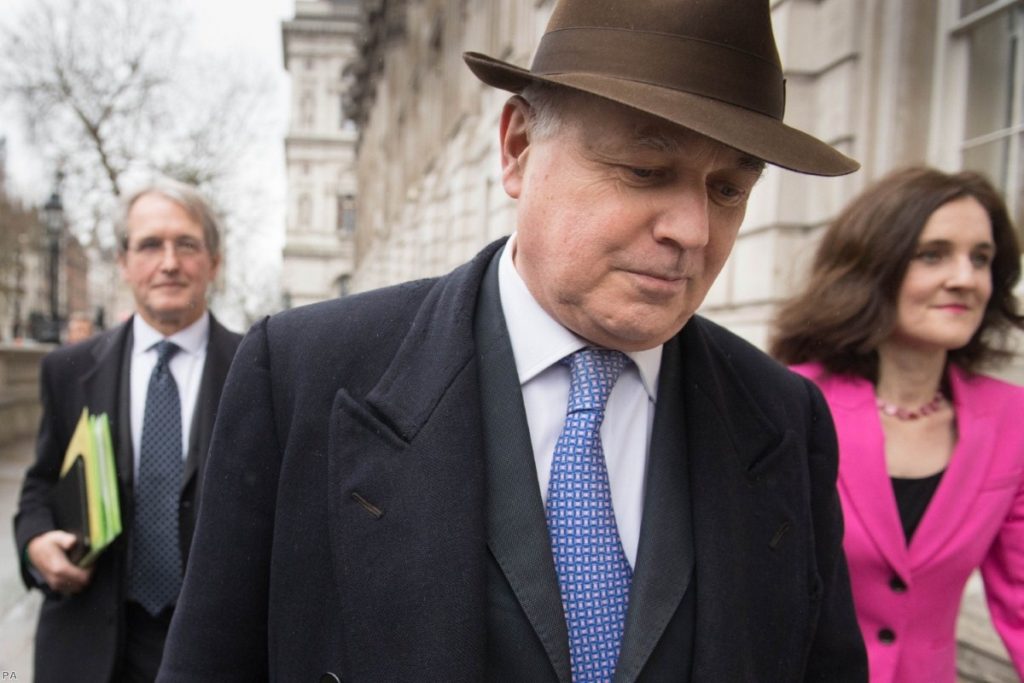By Steve Peers
We were told it was an "oven-ready deal". But despite the withdrawal agreement having pride of place in the Conservative party manifesto and no Conservative MPs voting against it, some Brexiter Tory MPs have now turned against it – including David Davis and now Iain Duncan Smith.
IDS in particular has transformed his U-turn into a car crash. He praised Boris Johnson's article exulting the withdrawal agreement and ridiculed the idea of debating the agreement at length on the grounds that it had been examined in detail already, but now says bits of it were "buried in the fine print" – to the tune of a £160 billion liability for the UK.
Do their criticisms of the agreement have any merit? As James Crisp has pointed out, Duncan Smith's claim about a £160 billion liability assumes that every single one of the European Investment Bank's investments fails without restructuring (the Bank has an AAA credit rating) – and that the EU countries decide to call upon capital rather than find other means of covering the liability.


The £160bn figure comes from the Sun and it might be unwise to rely upon it for EU law analysis –Ipso has previously rapped it for inaccuracy with regards to EU citizen benefits, EU trade policy, the Queen's view of the EU and the effect of EU membership on jobs.
For his part, Davis' claimed that a free trade agreement was "implicit" in the withdrawal agreement. But all the agreement does is require both sides to use their "best endeavours" to "negotiate" a free trade deal. In any event, a breach of the agreement cannot simply be unilaterally decided by one side and does not result in a unilateral power to end the treaty.
The withdrawal agreement does allow the Northern Ireland Assembly to end the special protocol on the Irish border, under certain circumstances – but otherwise there's no unilateral power to terminate it. As I have discussed in detail, this means that disputes about interpretation of the agreement have to be settled by its rules on dispute settlement. For instance, in the event that arbitrators find a breach, there could be fines – but there's no mention of terminating the treaty. Alternatively, it is possible for the agreement to be revised with the consent of all parties – but the EU is not interested in renegotiating.
Given that both these MPs voted for the agreement, they've hardly covered their tracks. It's less of a crime drama than a comedy – not so much Professor Moriarty as Dr Evil. Colombo would nab Davis in five minutes, without even having to say "just one more thing". Agatha Christie would not have to write a convoluted drawing room denouement. Having stood over the body holding the murder weapon since the first page, Duncan Smith's only defence would be to call Hercule Poirot an "unelected Brussels bureaucrat".
So why so obviously say one thing a few months ago and the opposite thing today? It could be that they genuinely forgot the platform they ran on, or what they voted for a few months ago. But to paraphrase a famous Doctor Who quote, "nobody could be as stupid as they seem". The more likely scenario is that they never meant what they said, biding their time until what they judged to be an appropriate moment to advocate trashing an agreement they never liked in the first place.
In fact, Duncan Smith has in effect subsequently confirmed this, in an article falsely claiming that the withdrawal agreement is a "work in progress" and that the UK can still "reject" it. He also apparently seeks to trash the agreement's provisions on citizens' rights – which already fall below what the Vote Leave campaign promised – and falsely claims that the EU is refusing to negotiate on services (the EU proposal for a trade deal contains 34 pages on this issue).
Needless to say, given the position that he ran on to get elected, this is pure charlatanry. Note that the Brexit party, which did run against the withdrawal agreement in the last election, got two per cent of the vote. So there is not the scintilla of an argument for a democratic mandate to denounce the withdrawal agreement here.
At the moment these are small, angry sounds from the Conservative backbenches. It remains to be seen whether the government adopts the view that the withdrawal agreement should be repudiated, and what the EU would do in response. But it is a useful reminder that at least some of those advocating the hardest of Brexits have the lowest amount of integrity.
Steve Peers is professor of law at the University of Essex. You can follow him on Twitter here.
The opinions in Politics.co.uk's Comment and Analysis section are those of the author and are no reflection of the views of the website or its owners.









